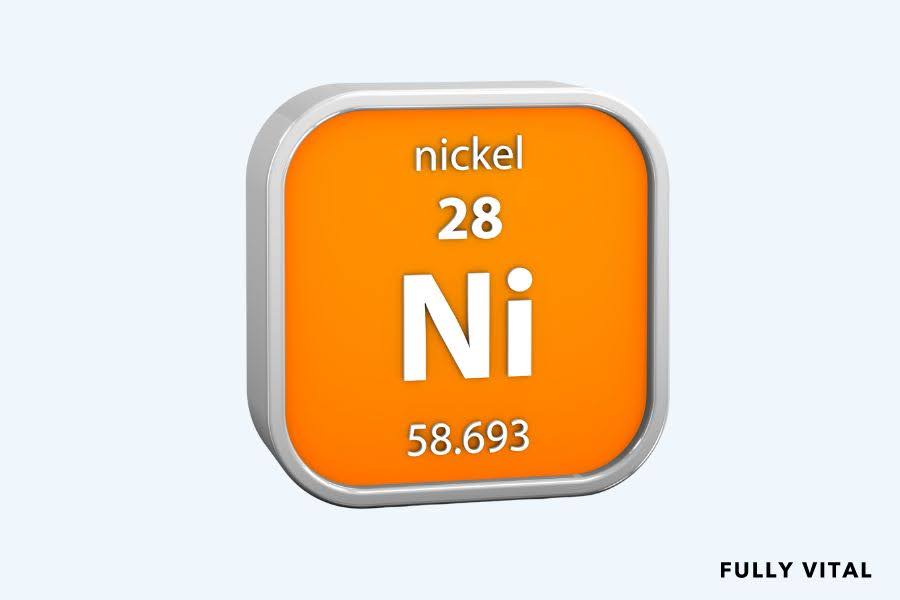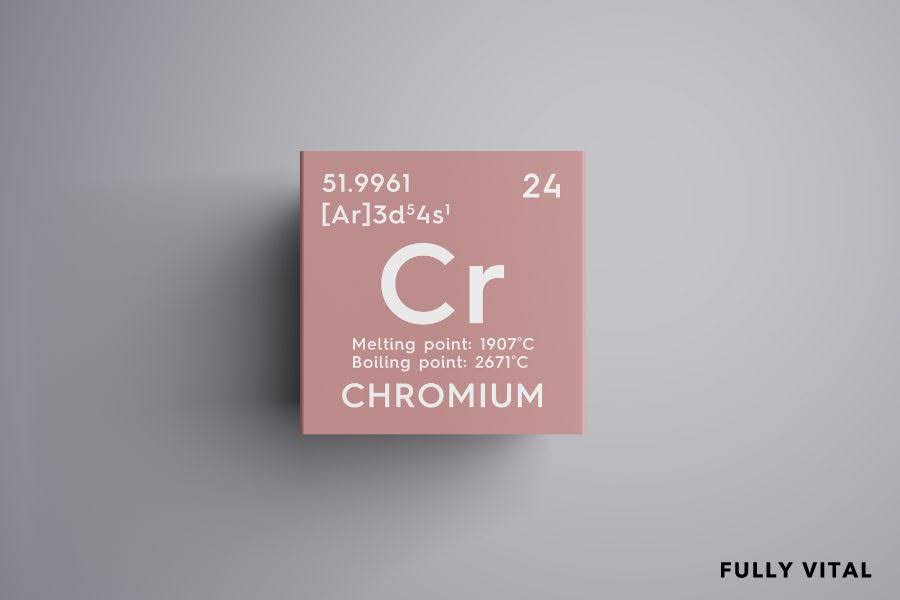
Nickel & Hair: Understanding the Connection
We often attribute hair health problems to familiar factors like diet, genetics, or the use of harsh chemical products.
However, there's a less frequently discussed element that can significantly impact the health of our hair: nickel.
While nickel might be better known in the context of coins or jewelry, its prevalence in our environment means that it can play a role in our hair's well-being.
In this article, we'll explore the connection between nickel and hair health.
We'll explore what nickel is, how it finds its way into our bodies, and the implications it has for our hair.
Alongside understanding these environmental factors, it's crucial to support your hair with the right products.
Our Hair Growth Serum is specifically designed to nourish and stimulate hair growth, countering the effects of environmental stressors like nickel.
Discover how our serum can help maintain your hair's health and vitality at Fully Vital.

I LOVE MY HAIR NOW
FullyVital hair serum and hair vitamins made tremendous improvements in my hair. I truly love my hair now.
Shop Hair ProductsWhat is Nickel?
Nickel is a metallic element, found naturally in the earth's crust and widely used across various industries.
It's a component of stainless steel, makes up metal alloys, and is present in many consumer products, including jewelry and coins.
However, it also has the potential to be an irritant.
People can be exposed to nickel by multiple means such as ingestion of nickel-containing foods, inhalation of nickel-laden dust, or skin contact with nickel-containing objects.
Understanding its presence and managing exposure is crucial for individuals sensitive to it.
Can Nickel Cause Hair Loss?
While there is no direct evidence that nickel causes hair loss, it is known to cause allergic contact dermatitis, which could indirectly affect hair health.
Individuals with prolonged exposure to nickel could develop a localized reaction on the scalp, potentially leading to inflammation and irritation.
This scalp condition could weaken hair follicles or disrupt hair growth cycles, contributing to hair thinning or loss over time.
Nonetheless, hair loss usually has multifaceted origins, and nickel sensitivity should be considered alongside other factors.
How Does Nickel Affect Our Hair's Health?
The Role of Nickel in Scalp Inflammation
Nickel's propensity for inducing an allergic reaction can lead to scalp inflammation, characterized by redness, itching, and discomfort.
Inflammation can disrupt normal hair follicle function, eventually affecting hair growth.
The body's immune response to nickel on the scalp can cause unnecessary stress to hair follicles, potentially leading to premature hair loss and a reduction in overall hair density.

Nickel's Impact on Hair Follicle Structure
When the scalp is subjected to excessive nickel, it can alter the hair follicle structure.
This interaction can lead to weakened strands that are prone to breakage.
Continuous exposure can interfere with the hair's natural growth cycle, and without intervention, the hair may not regain its typical strength and vitality, emphasizing the importance of identifying and addressing nickel exposure early.
Oxidative Stress and Hair Health
Nickel can contribute to oxidative stress, which is an imbalance between free radicals and antioxidants in the body.
This stress can harm cellular components, including those of hair follicles.
When hair follicles are compromised, the quality and growth of hair can deteriorate over time, leading to changes in texture and, potentially, increased hair shedding.
How Can You Prevent Excessive Nickel Exposure and Mitigate Risks?
Identifying Sources of Nickel
Prevention starts with identifying the most common sources of nickel.
This can include items such as inexpensive jewelry, certain foods, dental braces, and even some electronic devices.
Once these sources are identified, individuals can make conscious choices to switch to nickel-free products and reduce the risk of unnecessary nickel introduction into their systems.
Protective Measures
Taking protective measures like wearing gloves when handling nickel-releasing objects, choosing stainless steel or other nickel-free materials, and covering skin that may come into contact with nickel can minimize exposure.
Implementing these simple daily practices can be a significant step in mitigating allergic reactions and associated hair health concerns.
Dietary Considerations
Because nickel is also found in various foods, those with heightened sensitivity may need to adjust their diet.
Foods high in nickel include certain legumes, nuts, canned foods, and chocolate.
Moderation or avoidance of such foods, coupled with an emphasis on a diversified diet, can reduce overall nickel consumption, which may benefit hair health.
What Are the Treatment Options for Hair Issues Caused by Nickel?
Topical Treatments for Scalp Reactions
For those experiencing scalp reactions due to nickel, topical corticosteroids can provide relief from itching and inflammation.
These treatments, used under medical supervision, can minimize the impact of an allergic reaction on the scalp and aid in maintaining a healthy environment for hair growth.
Barrier Creams for Skin Protection
Barrier creams that contain ingredients like dimethicone can prevent nickel from penetrating the skin.
Regular use of such creams, particularly on the hands and wrists which commonly come into contact with nickel-containing items, can be an effective preventative measure.
Systemic Therapy Approaches
In more severe cases of nickel-induced dermatitis, systemic therapy options like antihistamines or corticosteroids taken orally may be recommended by a healthcare provider.
These medications can address the underlying allergic response, providing a more holistic approach to managing symptoms and promoting hair health.
How Can You Monitor Your Nickel Intake and Exposure Effectively?
Awareness of Symptoms
Being aware of the symptoms of nickel allergic reactions, such as skin rash, itching, and redness, is the first step in monitoring for nickel exposure.
Noticing these symptoms, especially in areas that come into contact with potential nickel sources, can prompt further investigation.

Use of Testing Kits
There are nickel testing kits available that can detect the presence of nickel in metal items.
These simple-to-use kits can help individuals identify and avoid contact with items high in nickel content, thus reducing the risk of exposure.
Professional Medical Testing
Healthcare providers can conduct patch tests or blood tests to determine nickel sensitivity and exposure levels.
These tests provide insights into individual sensitivity and guidance on how to manage exposure to optimize hair and skin health.
Protect Your Hair with Fully Vital
Take Action for Healthier Hair! Empower yourself with knowledge and resources from Hair Growth Products for stronger, healthier hair. |
Final Thoughts On Nickel
Nickel is an environmental factor that can subtly influence our hair's health and wellness.
By staying informed about its potential effects and adopting proactive strategies for monitoring and managing exposure, we can protect our hair's vitality.
It's key to remember that while nickel may play a part, healthy hair is a result of holistic care that considers all aspects of our diet, environment, and lifestyle.
As we gain more understanding of these environmental factors, we empower ourselves to make better health decisions, leading to a life of vitality.
In this journey towards healthier hair, exploring our range of hair growth products can be a game-changer.
Our products are specifically formulated to nourish and strengthen your hair, countering environmental stressors like nickel.
Discover how our variety of hair care solutions at Fully Vital can enhance your hair's health and resilience.
Read Also:
- Hair Coloring: A Comprehensive Guide For Beautiful Locks
- Anti Dandruff Shampoo: Your Ultimate Guide To Healthy Hair
- Hair Mousse: The Ultimate Guide For Healthy Hair Growth
Frequently Asked Questions About Nickel
Is nickel found in tap water and can it affect my hair?
Nickel can be present in trace amounts in tap water, but typically at levels insufficient to affect hair health.
However, excessively high nickel content due to industrial pollution could pose a concern and may warrant filtration solutions.
Can my hair accessories contain nickel?
Yes, some hair accessories, particularly those made from metal, may contain nickel.
Opt for nickel-free or hypoallergenic accessories to minimize the risk of exposure.
Are organic hair care products free from nickel?
Organic hair care products may still contain trace amounts of naturally occurring nickel, although generally lower than non-organic items.
Always check product labels and certifications to ensure minimal exposure.
How can I tell if my hair loss is related to nickel sensitivity?
If you suspect nickel sensitivity, look for additional signs of contact dermatitis, such as itching or redness, especially on the scalp.
Consult with a dermatologist for an accurate diagnosis and correlation.
Are there particular hair types more susceptible to nickel-related issues?
Hair type does not necessarily dictate susceptibility to nickel-related issues; however, those with already sensitive scalps or pre-existing skin conditions may experience more pronounced reactions to nickel.
Does the body require any amount of nickel for healthy hair growth?
Nickel is not considered an essential nutrient for hair growth, and excessive intake can potentially lead to health issues rather than benefits.
Can children be affected by nickel-related hair issues?
Yes, children can be sensitive to nickel just like adults and may experience similar skin or hair problems due to exposure.
It's crucial to monitor their contact with potential sources.
Should I worry about nickel in hair dyes?
Most hair dyes should not contain significant amounts of nickel.
It's advisable to choose reputable brands and perform patch tests before application to mitigate risks of allergic reactions.
Can nickel in my diet affect my hair's texture?
While direct effects on hair texture due to dietary nickel are not well-documented, systemic allergic reactions could potentially impact overall hair health and texture.
Does living in an urban environment increase my risk of nickel exposure and its impact on hair health?
Urban settings may have higher concentrations of nickel due to industrial activities and pollution.
It's important to consider environmental factors as part of a comprehensive approach to hair care.
Sources:
- Michalak, I., Mikulewicz, M., Chojnacka, K., Wołowiec, P., Saeid, A., & Górecki, H. (2012). Exposure to nickel by hair mineral analysis. Environmental Toxicology and Pharmacology, 34(3), 727-734. https://www.sciencedirect.com/journal/environmental-toxicology-and-pharmacology
- American Contact Dermatitis Society (2023, November 10). Allergic contact dermatitis to non-metallic components and metals in hair dyes. https://pubmed.ncbi.nlm.nih.gov/35318978/
- National Institutes of Health (2023, December 12). Nickel. https://pubchem.ncbi.nlm.nih.gov/compound/Nickel








